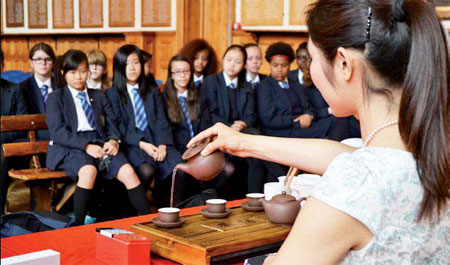| About Hubei | Culture & Arts | ||
| Attractions | Routes | ||
| Dining | Shopping | ||
| Hotels | Transportation | ||
| Entertainment | Travel agencies |
Jingshan to attract Wuhan tourists
Storytelling queen
For the love of Wuhan
Dangyang to promote tourism


Teachers take home fresh ideas
By Zhao HuanXin and Tang Yue (China Daily)
Updated: 2013-09-13
Spending three years teaching at a confucius institute in a foreign country is like living a second life
When you give someone a hug, you usually get one in return. This is exactly what hundreds of Chinese teachers and volunteers have experienced after working for Confucius Institutes overseas.
"Almost every teacher who has taught abroad would say that he or she has lived an extra life compared with people who haven't had that experience," says Xu Lin, director-general of Hanban, the Confucius Institute headquarters in Beijing.
"Their horizons were broadened and their lives changed in many ways, after meeting people and seeing things they had never imagined."
Every year, Xu's organization sends about 10,000 Chinese teachers and volunteers to teach at Confucius Institutes and Confucius Classrooms in more than 100 countries and regions around the world.
Most of them are from Chinese universities, some are college graduates. They stay abroad for a maximum of three years, teaching Chinese language and culture, according to Xu.
"They have to overcome many difficulties in everyday life and adapt to differences in culture and customs, but they also learn a lot," she says.
For one thing, Chinese teachers are often stunned to see how pupils' interests are highlighted in primary schools in the US and other countries.
"In the US and Britain, you must have at least five students in a class, otherwise it will be closed," Xu says. "So Confucius teachers have to make their classes as interesting as possible; and they often succeed."
Xu says that often, after attending classes for a few months, many pupils do not want their teachers to leave; some even cried when their favourite teacher returned to China.
When these teachers do go home, they apply what they have learned overseas. Xu says that if they continue teaching back in China they try hard to arouse students' interest and interact with them more than teachers normally do in China.
For a year from July 2010, Ren Zexiang was a volunteer teacher at the Marshalltown High School in Iowa, in the US. She says she was impressed by the easy and happy life at the US campus where students' interests and hobbies were well catered for.
"The school has a lot of selective courses for students to choose from, including carpentry, pottery, cooking and even baby nursing," says Ren, who now teaches at the Yunyang Teachers' College in Central China's Hubei province.
"They don't have homework for winter or summer vacations, and they can take part-time jobs to earn some pocket money."
To apply what she had learnt from the US experience at her college, Ren offered to teach two courses training English teachers for primary schools.
"It makes a tremendous difference when you employ different teaching methods," she says.
"We used to resort to translations when we taught English vocabulary. Now I ask the students to come up with ways - as enjoyable as possible - such as drawing, storytelling and even displaying objects. That way, they learn new words while they're doing these things."
Ren says she would like to teach at a Confucius Institute again, because after working in China for two decades, she has things to share with foreign students, and she also wants to learn more about teaching from her foreign colleagues.
Huang Weichao, who worked at the New Lynn Primary School and Kelston Girls' College in Auckland, New Zealand, in 2011, says he found that teachers and students spent a lot of time "chatting" on carpets in class, where the walls were decorated with students' photos and paintings.
Also, the students were allowed to move about the classroom after just raising their hand to ask for permission.
"In China, this perhaps happens only in kindergartens," Huang says in a report posted at the website of China News Service.
Huang also says teachers at New Zealand schools says "good girl, good boy" a lot to students who have made even the slightest progress or done something the right way. In China, such phrases are reserved for rare occasions.
"We must learn from foreigners in this respect, even if our children have learnt something easy, we should still congratulate them," Huang says.
|
A teacher at the Goldsmiths Confucius Institute for Dance and Performance in Goldsmiths University of London performs a tea ceremony at a local high school. Open classes are held to promote traditional Chinese culture. Provided to China Daily |
